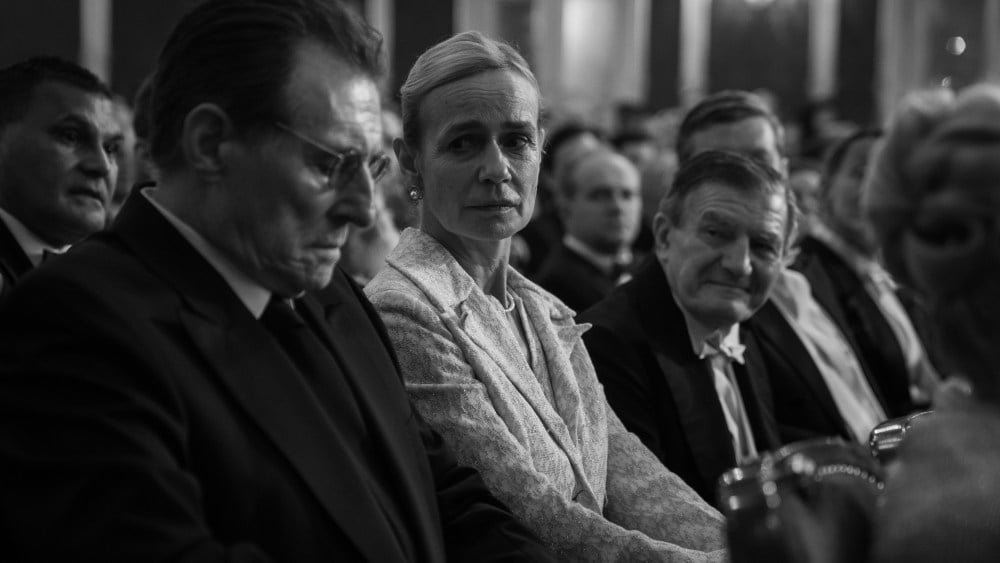James Marsh’s Staid Samuel Beckett Biopic
[ad_1]
In a genre not traditionally given to brevity, James Marsh‘s literary biopic “Dance First” at least has that on its side: In 100 minutes, it races through the key events and alliances in the life of Irish author and dramatist Samuel Beckett, even finding time for some metaphysical musings alongside the cradle-to-grave checklist. But Beckett’s characteristic terseness — or radical “lessness,” to borrow a title from one of his stories — isn’t a feature of this creditable but ponderous film, which ultimately achieves its efficient runtime by skirting any meaningful engagement with Beckett’s work and literary legacy. What’s left is an anatomy of his unhappiness via a procession of stymied or soured relationships: shot with grace, acted with intelligence, but short on Beckettian daring or wit.
It’s another biopic from Marsh, following 2014’s popular “The Theory of Everything” and 2017’s less-seen “The Mercy,” that resists bringing his flinty gifts as an Oscar-winning docmaker (“Man on Wire,” “Wisconsin Death Trip”) to the table — instead trading in the softer, more romantic filmic language of adult prestige drama. With its chaptered structure and sporadic segues into Beckett-styled surrealism, “Dance First” may flirt more with experimentation than “Theory” did, but these are still timid, tasteful flourishes on a mostly conventional canvas. Beckett scholars are unlikely to feel stimulated, which is fair enough — they’re an ornery bunch. But the unacquainted aren’t given much to go on either. Sky will release the film (this year’s closer at the San Sebastián fest) theatrically in the U.K. and Ireland in November, before shifting it to their streaming platform.
It opens in 1969, at the Nobel Prize ceremony where the typically recalcitrant Beckett (played in his later years by Gabriel Byrne) is awarded the literature honor: “What a catastrophe,” he mumbles to his wife Suzanne (Sandrine Bonnaire) as he’s summoned to the stage. Bypassing the podium, he instead climbs the stage-side ladder into the lighting grid, disappearing into an exit tunnel that expands into a stony, echoing cavern where another Beckett (Byrne again) is solemnly waiting for him. Thus begins the most elaborate conceit of the script by Scottish TV writer Neil Forsyth, as a mordant running conversation between the two Becketts — one self-recriminating, the other more archly ironic — frames and introduces the various stages of his past.
Fashioned as a kind of tribute to the writer’s most famous work “Waiting for Godot,” these sections superficially evoke Beckett in form, but are too literal and schematic to do so in text — as the Becketts jointly decide to elect a figure from his past who’s more deserving of the Nobel prize money, embarking on a “journey through [his] shame” to do so. (“Isn’t everything?” one of them remarks: Such stabs at glum drollness are mostly confined to the otherworldly cavern.) Our first stop is Beckett’s early childhood in suburban Dublin, where the young lad’s love of poetry and lyrical thinking is nurtured by his kindly father William (Barry O’Connor) and challenged by his gorgon-like mother May (Lisa Dwyer Hogg). When William dies (at least in Forsyth’s slightly fictionalized timeline) the young Beckett’s last sense of loyalty to home go with him. Paris beckons, with dad’s deathbed command to “fight, fight, fight” echoing in his ears — and, rather too recurrently, throughout the film.
In the City of Lights, the twentysomething Beckett (now played by a lanky, endearing Fionn O’Shea) cultivates some starving-artist credibility and awkwardly talks his way into working as an assistant to James Joyce (Aidan Gillen), whose family adopt him as a kind of tweedy pet. His exchanges with Joyce, given an air of blustery perspicacity by a fine Gillen, have some welcome intellectual snap and tension, but the mentorship ends when Beckett rejects a proposal from the Joyces’ schizophrenic flapper daughter Lucia (a ripe Gráinne Good, having more fun than most here). We move on to Beckett’s formative friendship with fellow Joyce protégé Alfy Péron (Robert Aramayo) and their exploits in the French Resistance during the Second World War — Alfy’s death therein cuing a lifelong burden of guilt that isn’t dramatically supported by his sketchy characterization here.
The film’s heart lies in Beckett’s long-term, love-hate partnership with Suzanne, played as a young woman by Léonie Lojkine with a bright, besotted optimism that hardens into a more embittered devotion by the time Bonnaire takes over — as if infected over the decades by the writer’s jagged, doleful worldview. His affair with BBC drama commissioner Barbara Bray (Maxine Peake) doesn’t help matters but also doesn’t sever his bond with Suzanne: In the film’s sharpest performance, Bonnaire’s straight-shouldered severity gives her the edge equally in the couple’s domestic disputes and their literary spats, Byrne’s Beckett receding into himself all the while.
Their arguments over his work — relative to Bray’s more fawning patronage — would be more compelling if “Dance First” gave us a clearer evocation of the work in question. But aside from the odd name-dropped title, and a brief glimpse of a scene from his 1963 one-acter “Play,” there’s little sense here of what chafed and excited audiences about Beckett’s ideas, and indeed his language, beyond a general description of its challenging or avant-garde qualities. (“Nothing happens, it’s a masterpiece,” Bray trills at one point.)
Literary careers are hard to encapsulate on screen: What could teach you more about Beckett, after all, than reading him? But neither does “Dance First” fully capture the subversive elements of a life that might reflect its output. It’s all so well-behaved and well-presented — between the elegant but not expressionist chiaroscuro of Antonio Paladino’s cinematography, and the sweetened melodic sweep of Sarah Bright’s score — that Beckett’s difficulties, along with his grim humor and deadpan playfulness, feel somewhat ironed out. “Dance first, think later,” goes the Beckett quote that supplies the title, but Marsh’s film never quite loses its head.
[ad_2]
Source link

